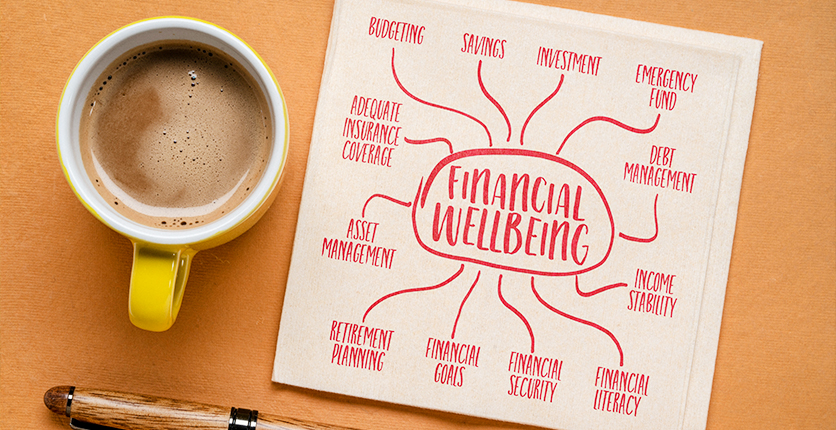Just as we strive to look after our physical and mental health, we should make an effort to be financially healthy. Being financially fit means having good financial habits that allow us to accomplish our short-term and long-term wealth goals. This entails living within our means, paying down our debts and settling our bills on time, saving money regularly and setting a realistic budget, planning for retirement, and protecting our assets. When we’re financially fit, we have the financial freedom to enjoy life the way we want, now and when we’re older.
We asked Ow Tai Zhi, the co-founder and chief investment officer for robo-advisory platform AutoWealth, for tips and ideas on how to attain financial fitness.

Q: How important is budgeting when it comes to financial fitness and building wealth?
Tai Zhi: It’s very important. In general, the average person should set aside 20 per cent of their monthly income for retirement and $500 a month for each of their children’s needs. According to the Ministry of Education’s Graduate Employment Survey, the undergraduate median starting salary across all courses averages $3,813 before employee CPF contributions in 2021. Using this income as an example, young graduates should save $763 a month for retirement and $1,000 a month for two children’s education needs. This means having $1,287 left to spend.
If you have a tendency to overspend, consider downloading a free expense-tracking app to help you manage your expenses. Alternatively, you may set up a regular investment plan so that you’re “forced” to stay disciplined and focused on achieving your financial goals.

Q: Where’s a good place to park our money if we’re trying to grow it for retirement?
Tai Zhi: Assuming we’re working with a 6 per cent rate of return for investments, we would need 35 years to turn monthly contributions of $500 into $720,000 of retirement funds. At a 1 per cent rate of return for a deposit account, you’d need 78 years to achieve the same. This illustrates why it’s crucial to save and invest rather than solely rely on a deposit account.
Here’s more on investing and choosing a wealth planner to grow your family’s wealth.

Q: Do you have any tips for reducing or controlling debt?
Tai Zhi: Taking on a sustainable level of debt at an affordable interest rate is a rational way to accelerate and achieve your capital-intensive financial goals, like buying a home, early in life. After all, it’s not feasible for most young adults to put down six-figure amounts upfront for a house.
The Monetary Authority of Singapore’s regulated limit for total debt servicing ratio is 55 per cent of one’s monthly income. That said, I suggest not spending more than 50 per cent of your income on servicing debt. It’s also prudent to cater for potential interest rate increases on your debt, and to consider carefully your ability to service debts before making additional long-term financial commitments.

Q: Why is good credit management important and how can poor credit management affect our long-term financial fitness?
Tai Zhi: You need to remember that debt typically comes at a cost, in the form of the interest you pay. If you over-extend yourself, the interest burden may become so insurmountable that an excessive portion of your income would be required to pay off the periodic interest. This may leave you with inadequate savings and investments and a miserable budget for your monthly expenses. Besides, banks and credit companies typically charge higher interest rates as your debt burden increases to compensate for the higher risk of bad debts.

Q: How much is a realistic amount to save for retirement, and how exactly do we plan financially for this?
Tai Zhi: As a general guide, the average 30-year-old Singaporean today would need at least $1,500 in today’s money value per month or $3,000 inflation-adjusted money value in 35 years’ time to retire comfortably for 20 years. To achieve this, you’d need to save and invest $500 a month for 35 years.
That said, many of us aspire to retire with a higher living standard, especially if we earn more than the average Singaporean. Therefore, I suggest that you set aside at least 20 per cent of your monthly income for retirement.
Here are more tips to tackle rising costs and insulate yourself from inflation.

Q: Can you suggest some ways to protect our financial assets?
Tai Zhi: A well-balanced diet helps us grow and keeps us healthy. Our financial health needs the same, too. For a well-designed investment portfolio to grow healthily, it needs a good balance and variety of portfolio assets. Think of stocks as fried chicken. They make us feel good and give our portfolio “protein” to grow bigger. But too much puts our portfolio at high risk of developing health problems. Bonds, on the other hand, are like vegetables. While less exciting and tasty, they’re nutritious and essential. They grow our wealth slowly and steadily and help us mitigate some of the health risks from an excessive consumption of fried chicken.
Using the 2008 Great Financial Crisis as a reference point, stocks across the world declined 50 to 55 per cent in value during the peak of the market crash. On the flip side, government bonds across the world appreciated 20 to 25 per cent in value over the same period, due to investors’ flight to safe-haven assets. Having bonds in your portfolio means a difference between catastrophic and manageable losses. You could even exercise the flexibility to take some profits on government bonds and buy into stocks at the huge market discount to capitalise and earn extra returns on the eventual market recovery.
As Singapore celebrates 55 years of National Service, AutoWealth would like to show our gratitude towards all our soldiers! Sign up today and indicate “NS55” under the referrer code to receive S$55 top-up to your account. Go to autowealth.sg//promotions//ns55.php for more info.
Want more articles like this, and other lifestyle content right in your inbox? Download the new SAFRA mobile app and opt in for the eNSman Newsletter – you don’t need to be a SAFRA member to subscribe – and never miss another story!









